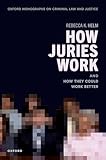How juries work : and how they could work better / Rebecca K. Helm.
Series: Oxford monographs on criminal law & justicePublisher: New York : Oxford University Press, 2024Edition: 1Description: xxiii, 209 pages 22 cmContent type:- text
- 9780192857293
- 345.075
| Item type | Current library | Shelving location | Call number | Materials specified | Status | Notes | Barcode | |
|---|---|---|---|---|---|---|---|---|
 BOOKs
BOOKs
|
National Law School | On Display | 345.075 HEL (Browse shelf(Opens below)) | HB | Not For Loan | Recommended by Dr. Arul George Scaria | 39898 |
The majority of common law jurisdictions, and some civil law jurisdictions, use juries composed of citizens drawn from the general population to deliberate and reach collective verdicts in criminal cases. Juries are relied on to use their collective judgment to reach verdicts that accord with normative legal goals; for example, by being accurate and fair.
How Juries Worksuggests that, though important symbolically, the current jury system is not necessarily well designed to meet the demands of modern society, which increasingly requires evidence-based procedure that is carefully designed to achieve normative goals. Rebecca K. Helm proposes new models of how jurors and juries function in practice, informed by psychological theory and empirical research, which provide a framework to interpret and integrate the large body of existing work on jury decision-making. Drawing on this framework, Helm highlights the deficiencies and strengths of the jury as a legal fact-finder, providing key insights into how to minimize deficiencies and maximize strengths through trial procedure. The book concludes with a set of timely evidence-based suggestions as to how procedure surrounding trial by jury might be altered to enhance the administration of justice in the many jurisdictions where the criminal law jury is utilized.
How Juries Workintegrates legal and psychological theory and research to present a comprehensive assessment of the modern criminal law jury, and of how evidence-based research can improve jury performance. Provided by publisher.
There are no comments on this title.
